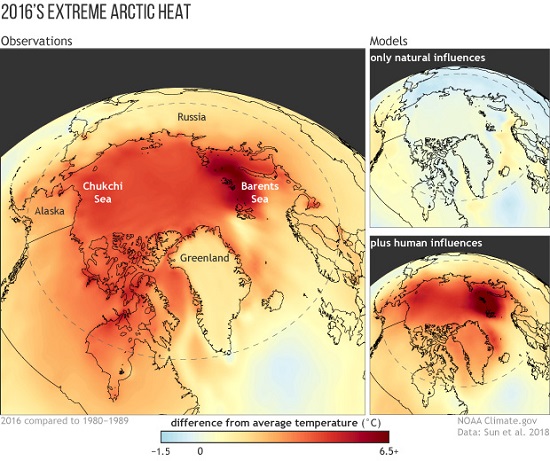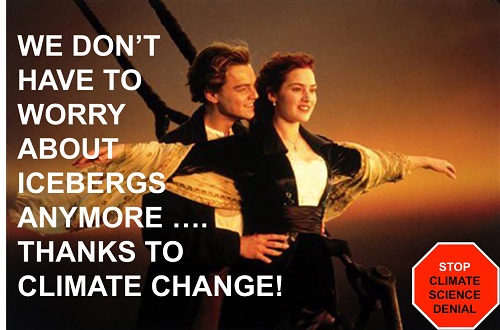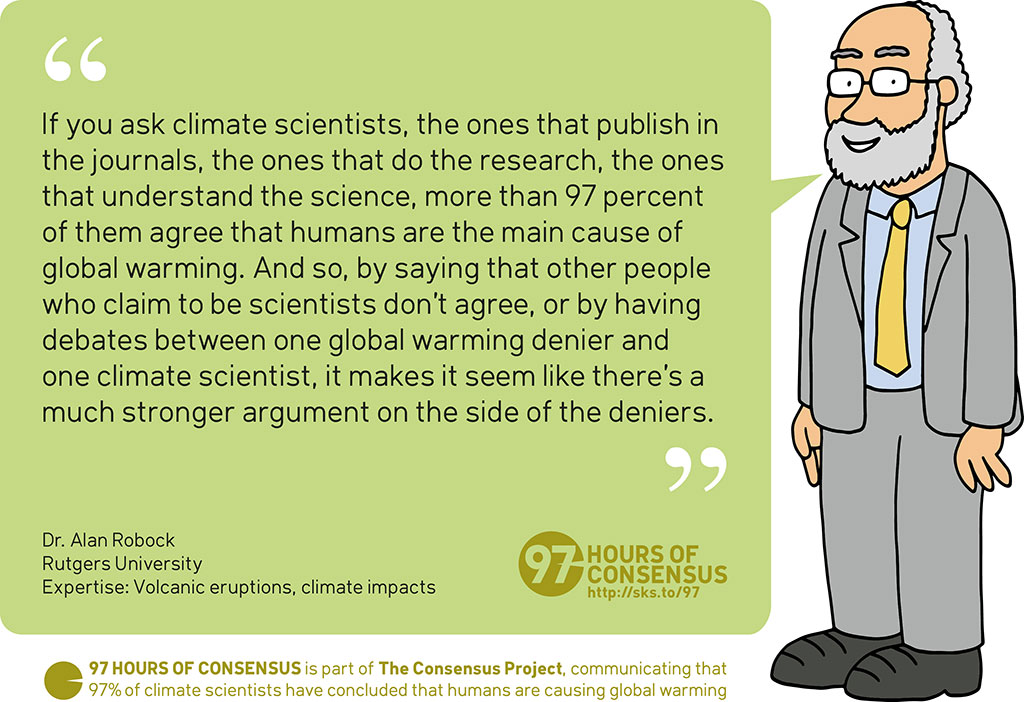Story of the Week... Toon of the Week... Graphic of the Week... SkS in the News... SkS Spotlights... Video of the Week... Coming Soon on SkS... Poster of the Week... SkS Week in Review... 97 Hours of Consensus...
Story of the Week...
2016 Arctic heat would have been virtually impossible without global warming

In the fall of 2016, the Arctic experienced heat that was so extreme that one expert called it a black swan event. That warmth helped set a new annual temperature record that was double the magnitude of the record set the year before. New NOAA-led research confirms that the event could not have happened without human-caused global warming and sea ice loss.
These maps compare the observed differences from average temperature in 2016 (left) to two computer simulations of 2016 (right). The top right map shows results from models that included only natural climate influences, using estimated conditions from the late nineteenth century. The bottom right map shows results from models in which things like greenhouse gases, sea surface temperatures, and sea ice were allowed to change as they have in the real world due to human activities.
None of the simulations using only natural climate influences were able to reproduce the extreme warmth that overtook the Arctic in 2016. Instead, those models projected that there would have been some areas that were cool and some that were warm, but not extremely so. Only the simulations that mirrored human-caused changes in greenhouse gases and the resulting sea ice loss were able to generate a realistic picture of the extreme heat. The most realistic simulations were generated by models in which sea ice was not only allowed to shrink in area, but also to thin—just as it has in the real world.
The scientists concluded that there was virtually zero chance that such an extreme heat event would have occurred without human influence on the climate. But they also concluded that its severity—exactly how far above average the temperatures were— was partially due to natural variability, including the influence of the strong 2015-16 El Niño event in the tropics.
This overlap of the impacts of human-caused climate change and natural variability is a common theme for many types of extreme weather events from high-tide flooding to heavy downpours. Events like the extreme warmth in the Arctic in 2016 are an early preview of what “normal” may look like within as little as a decade if greenhouse gas emissions continue their rapid rise.
References:
Sun, L., Allured, D., Hoerling, M., Smith, L., Perlwitz, J., Murray, D., & Eischeid, J. (2018). Drivers of 2016 record Arctic warmth assessed using climate simulations subjected to Factual and Counterfactual forcing. Weather and Climate Extremes, 19, 1–9. https://doi.org/10.1016/j.wace.2017.11.001
2016 Arctic heat would have been virtually impossible without global warming by Rebecca Lindsey, NOAA's Climate.gov, May 7, 2018
Toon of the Week...

Hat tip to Stop Climate Science Denial.
Graphic of the Week...

2018 Arctic temperatures (red line) compared with other years back to 1958. (Danish Meteorological Institute data adapted by Zachary Labe)
Another extreme heat wave strikes the North Pole by Jason Samenow, Capital Weather Gang, Washington Post, May 7, 2018
SkS in the News...
The Climate Denier Roundup article, Free Speech on Campus Under Attack...By the Koch Bros, posted on the Daily Kos includes the following:
Case in point: the AP last week reported that newly released documents from 2003 to 2011 revealed that the Kochs had influence over the hiring process for their Mercatus center at George Mason University. Considering the Kochs had funded the center to the tune of nearly $50 million, this should be more of a confirmation of suspicions than startling revelation. (To be perfectly clear, the Mercatus Center is somewhat independent of George Mason itself, which employs great folks like climate communications researcher Ed Maibach and Dr. 97% himself, John Cook.)
SkS Spotlights...
Program in Atmospheres, Oceans and Climate (PAOC)
PAOC oversees a broad program of education and research in atmospheric, oceanic, and climate sciences. We are engaged in some of the most intellectually challenging and important problems in science, such as the physics of hurricanes, and the dynamics of ice ages. PAOC is part of the Department of Earth, Atmospheric and Planetary Sciences at MIT and includes members from other MIT departments and from Woods Hole Oceanographic Institution.
The phenomena under study involve a large array of scientific disciplines - geophysics, geochemistry, physical and chemical oceanography, meteorology, atmospheric chemistry, and planetary science. The program carries out research and gives instruction in all of these principal areas. Perhaps more than any other program in the world, PAOC offers its students unique opportunities for interdisciplinary study and research. In all areas we emphasize a combination of theoretical, observational and modeling approaches.
Students and researchers come from all over the world attracted not only by our programs but also the city of Cambridge and its environs which contain many institutions active in atmospheric and oceanographic research; Harvard University, Woods Hole Oceanographic Institution, and the Boston Office of the National Weather Service, as well as many private companies.
Contact with all of these institutions is maintained through seminars and symposia. Moreover students can formally take subjects at the Woods Hole Oceanographic Institution and Harvard University. The research and educational programs of PAOC also benefit from the larger intellectual milieu provided by MIT with its strengths in science and engineering. In research there are no departmental boundaries and we collaborate freely across discipline. PAOC is also involved in undergraduate education within the Department of Earth, Atmospheric and Planetary Sciences.
Coming Soon on SkS...
- California, battered by global warming's weather whiplash, is fighting to stop it (Dana)
- SkS Analogy 12 - A sinking ship reaches new heights (Evan Whitby)
- Global warming, hurricanes, and rain (John Abraham)
- Global solar capacity grew faster than fossil fuels in 2017, says report (Simon Evans)
- New research this week (Ari)
- 2017 SkS Weekly Climate Change & Global Warming News Roundup #20 (John Hartz)
- 2017 SkS Weekly Climate Change & Global Waming Digest #20 (John Hartz)
Poster of the Week...

SkS Week in Review...
- 2018 SkS Weekly Climate Change & Global Warming News Roundup #19 by John Hartz
- New research, April 30 - May 6, 2018 by Ari Jokimäki
- Analysis: How much ‘carbon budget’ is left to limit global warming to 1.5C? by Zeke Hausfather (Carbon Brief)
- Global warming is melting Antarctic ice from below by John Abraham (Climate Consensus - the 97%, Environment, Guardian)
- The 1970s Global Cooling Zombie Myth and the Tricks Some People Use to Keep it Alive, Part II by David Kirtley
- Global warming will depress economic growth in Trump country by Dana Nuccitelli (Climate Consensus - the 97%, Environment, Guardian)
- 2018 SkS Weekly Climate Change & Global Warming Digest #18 by John Hartz
97 Hours of Consensus...

Alan Robock's bio page and quote source.
High resolution JPEG (1024 pixels wide)
from Skeptical Science
via IFTTT